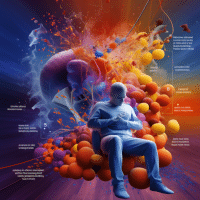Thyroid and Diabetes Symptoms: Navigating the Interplay
 Thyroid and Diabetes Symptoms
Thyroid and Diabetes Symptoms
Navigating the interplay between thyroid and diabetes symptoms can be a daunting task. It is important to understand the relationship between the two conditions and how they can affect one another. Thyroid and diabetes symptoms can be similar, making it difficult to differentiate between the two. It is important to be aware of the signs and symptoms of both conditions, as well as the potential complications that can arise from having both. Knowing the signs and symptoms of both conditions can help you better manage your health and ensure that you are getting the best care possible.
Understanding Thyroid and Diabetes Symptoms
When it comes to understanding the interplay between thyroid and diabetes symptoms, it can be difficult to know where to start. It’s important to understand that both conditions can have similar symptoms, such as fatigue, weight gain, and difficulty concentrating. However, there are also some key differences between the two. For example, diabetes can cause frequent urination and increased thirst, while thyroid symptoms may include a rapid or irregular heartbeat.
It’s also important to note that thyroid and diabetes symptoms can be linked. For example, people with diabetes may be more likely to develop thyroid problems, and vice versa. Additionally, some medications used to treat diabetes can affect the thyroid, and vice versa. Therefore, it’s important to talk to your doctor if you have both conditions, as they can help you manage your symptoms and ensure that your medications are working properly.
Common Symptoms of Thyroid and Diabetes
When it comes to thyroid and diabetes symptoms, it can be difficult to differentiate between the two. Both conditions can cause fatigue, weight gain, and difficulty concentrating, making it hard to tell which is the culprit. However, there are some key differences that can help you identify which condition you may be dealing with.
For thyroid conditions, common symptoms include dry skin, brittle nails, and thinning hair. Additionally, those with thyroid issues may experience a rapid or irregular heartbeat, as well as difficulty sleeping. On the other hand, diabetes symptoms can include frequent urination, increased thirst, and blurred vision. It is also common for those with diabetes to experience numbness or tingling in their hands and feet.
It is important to note that thyroid and diabetes symptoms can overlap, so it is best to consult with your doctor if you are experiencing any of the above. With the right diagnosis and treatment plan, you can manage both conditions and live a healthy life.

The Interplay Between Thyroid and Diabetes Symptoms
When it comes to managing thyroid and diabetes symptoms, it can be difficult to navigate the interplay between the two. Thyroid and diabetes symptoms can often overlap, making it difficult to determine which condition is causing which symptoms. It is important to understand the relationship between the two conditions in order to properly manage both.
Thyroid and diabetes symptoms can be similar in nature, such as fatigue, weight gain, and difficulty concentrating. However, there are some key differences that can help distinguish between the two. For example, diabetes can cause frequent urination and increased thirst, while thyroid symptoms may include dry skin, brittle nails, and a hoarse voice. It is important to be aware of the differences between the two conditions in order to properly diagnose and treat them.
It is also important to understand the relationship between thyroid and diabetes symptoms. For example, diabetes can cause an increase in thyroid hormones, which can lead to an overactive thyroid. Conversely, an underactive thyroid can cause an increase in blood sugar levels, which can lead to diabetes. Knowing the relationship between the two conditions can help you better manage both.
Navigating the interplay between thyroid and diabetes symptoms can be challenging, but understanding the relationship between the two can help you better manage both conditions. By being aware of the similarities and differences between the two, you can ensure that you are properly diagnosing and treating both conditions.
Diagnosing Thyroid and Diabetes Symptoms
When it comes to diagnosing thyroid and diabetes symptoms, it can be difficult to determine which condition is causing the symptoms. Both thyroid and diabetes can cause similar symptoms, such as fatigue, weight gain, and difficulty concentrating. It is important to understand the interplay between these two conditions in order to accurately diagnose and treat them.
Thyroid and diabetes symptoms can overlap in many ways. For example, both conditions can cause fatigue, weight gain, and difficulty concentrating. Additionally, both conditions can cause changes in appetite, mood swings, and difficulty sleeping. It is important to note that the symptoms of each condition can vary from person to person, so it is important to consult with a doctor to determine the cause of the symptoms.

It is also important to understand the relationship between thyroid and diabetes. People with diabetes are more likely to develop thyroid problems, and people with thyroid problems are more likely to develop diabetes. Therefore, it is important to be aware of the risk factors for both conditions and to monitor for any changes in symptoms.
By understanding the interplay between thyroid and diabetes symptoms, it is possible to accurately diagnose and treat both conditions. Consulting with a doctor is the best way to determine the cause of the symptoms and to develop an effective treatment plan. An accurate diagnosis and treatment plan can ensure that you are properly diagnosing and treating both conditions.
In addition to an accurate diagnosis and a proper treatment plan, it is important to practice healthy lifestyle habits in order to reduce the risk of developing thyroid or diabetes symptoms. Eating a balanced diet, exercising regularly, and reducing stress can help prevent and manage both conditions. Regularly monitoring your blood sugar and thyroid levels is also important in order to detect any changes that could indicate the presence of either condition.
Managing Thyroid and Diabetes Symptoms
Managing thyroid and diabetes symptoms can be a tricky balancing act. It’s important to understand the interplay between the two conditions and how they can affect each other. Thyroid and diabetes symptoms can be similar, making it difficult to distinguish betwe life with ease. en the two. For example, fatigue is a common symptom of both conditions. It’s important to be aware of the other symptoms associated with each condition, such as weight gain or loss, changes in appetite, and changes in mood.
It’s also important to understand how thyroid and diabetes medications can interact. Some medications used to treat diabetes can affect the levels of thyroid hormones in the body, while some medications used to treat thyroid conditions can affect blood sugar levels. It’s important to talk to your doctor about any medications you are taking and how they may interact with each other.
By understanding the interplay between thyroid and diabetes symptoms, you can better manage your conditions and ensure that you are getting the best possible care. Your doctor can help you develop an individualized treatment plan to manage both conditions and reduce your risk for complications. It’s also important to keep in mind that early detection of either condition can help prevent.
Tips for Living with Thyroid and Diabetes Symptoms
Living with both thyroid and diabetes symptoms can be a challenge, but it doesn’t have to be overwhelming. With the right knowledge and support, you can learn to manage both conditions and live a healthy, balanced life. Here are some tips to help you navigate the interplay between thyroid and diabetes symptoms:
First, it’s important to understand the connection between the two conditions. Thyroid hormones play a role in regulating blood sugar levels, so when your thyroid is out of balance, it can affect your diabetes. It’s important to keep your thyroid hormones in check by getting regular blood tests and following your doctor’s instructions.
Second, it’s important to pay attention to your diet. Eating a balanced diet that is low in sugar and carbohydrates can help keep your blood sugar levels in check. Additionally, eating foods that are rich in iodine, such as seafood, can help support your thyroid health.
Finally, it’s important to stay active. Exercise can help regulate your blood sugar levels and boost your thyroid health. Aim for at least 30 minutes of moderate exercise each day.

By following these tips, you can learn to manage both thyroid and diabetes symptoms and live a healthy, balanced life. With the right knowledge and support, you can successfully manage both conditions. Have your doctor help you develop an individual monitoring plan to ensure that you are getting the best care. Regularly checking in with your doctor is a key part of managing both conditions and reducing your risk for complications. Additionally, if you have difficulty managing your symptoms on your own, seek out support from family, friends, and medical professionals to help you stay on track. With the right support system in place, you can manage your conditions successfully and live a healthy life.
It’s important to remember that these tips are not meant as medical advice – they are just general tips to help guide you when it comes to managing both thyroid and diabetes symptoms. Always consult with your doctor and follow their instructions for managing your health. With the right support and monitoring, you can live a long, healthy life.
In conclusion, it is important to be aware of the interplay between thyroid and diabetes symptoms. While the symptoms of both conditions can be similar, it is important to be aware of the differences and to seek medical advice if any symptoms are experienced. Diagnosis and management of both conditions are essential for living a healthy life. With the right knowledge and support, it is possible to navigate the interplay between thyroid and diabetes symptoms and live a full and healthy life.
Frequently Asked Questions
Q1: What are the most common symptoms of thyroid and diabetes?
The most common symptoms of thyroid and diabetes include fatigue, weight gain or loss, changes in appetite, dry skin, hair loss, muscle aches, and changes in mood. Other symptoms may include increased thirst, frequent urination, and blurred vision.
Q2: How can I tell if my symptoms are related to thyroid or diabetes?
If you are experiencing any of the symptoms listed above, it is important to speak with your doctor. Your doctor can perform tests to determine if your symptoms are related to thyroid or diabetes.
Q3: What is the interplay between thyroid and diabetes symptoms?
The interplay between thyroid and diabetes symptoms is complex. Thyroid hormones can affect blood sugar levels, and diabetes can affect the production of thyroid hormones. Additionally, both conditions can cause similar symptoms, making it difficult to differentiate between the two.
Q4: How can I diagnose thyroid and diabetes symptoms?
Diagnosing thyroid and diabetes symptoms typically involves a physical exam, blood tests, and other tests such as an ultrasound or CT scan. Your doctor may also ask you questions about your medical history and lifestyle.
Q5: What are some tips for managing thyroid and diabetes symptoms?
Managing thyroid and diabetes symptoms can be challenging, but there are some tips that can help. Eating a balanced diet, exercising regularly, and getting enough sleep are all important for managing both conditions. Additionally, it is important to take any medications prescribed by your doctor as directed.
Q6: Are there any lifestyle changes I can make to help manage my symptoms?
Yes, there are several lifestyle changes you can make to help manage your symptoms. Eating a healthy diet, exercising regularly, and getting enough sleep are all important for managing both conditions. Additionally, it is important to avoid smoking and limit your alcohol consumption.
Q7: Are there any support groups or resources available for people living with thyroid and diabetes symptoms?
Yes, there are many support groups and resources available for people living with thyroid and diabetes symptoms. Your doctor may be able to provide you with information about local support groups or online resources. Additionally, many organizations such as the American Diabetes Association and the American Thyroid Association offer support and resources for people living with these conditions.


















